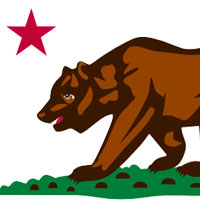Blessings from Bubba and a Baby
Big Endorsement and Tiny New Arrival Rejuvenate Gavin Newsom's Bid for Governor
Moments after his wife delivered the couple’s first child last week, Gavin Newsom had the same reaction as any other new father who happens to be running for high office in the digital age: He tweeted the news on Twitter.
“Jen’s doing great,” the wannabe California governor wrote of his wife, careful not to exceed the 140-character per-tweet limit. “Not sure she’s happy I am on Twitter.”
Well, duh.

While the San Francisco mayor’s way-too-wired, postpartum behavior probably alienated at least 50 percent of California’s voters, the arrival of seven-pound, 12-ounce Montana Tessa Newsom capped a week of celebration for the candidate, by far the best of his struggling campaign. Lagging behind likely Democratic opponent and Attorney General Jerry Brown, both in the polls and in fundraising, Newsom got a big political boost a few days earlier with a splashy endorsement by former president Bill Clinton.
The news of Bubba’s blessing got national coverage, reenergizing the 41-year-old mayor’s campaign at a time when California’s political cognoscente class was beginning to write him off. Politically helping Newsom in at least three key ways, the Clinton endorsement:
• Rejuvenates his efforts to raise money, not only through a gala L.A. fundraiser that Clinton will headline next month, but also by opening up access to major givers and bundlers of campaign cash who are loyal to the ex-president and to Secretary of State Hillary Clinton.
• Boosts Newsom in Southern California’s Latino community, the fastest-growing part of the state’s electorate, where the popularity of the Clintons most recently helped Hillary skunk Barack Obama in last year’s presidential primary.
• Provides a psychological boost to the stature of Newsom’s long-shot gubernatorial bid, which will encourage the media, political professionals, and Democrat insiders to take a second look at what so far has been a lackluster candidacy.
“It does mean something,” USC professor and pundit Sherry Bebitch Jeffe told NBC News, “because the buzz has been that Newsom hasn’t gotten traction, and he needed to get some traction.”
PLAYING HARDBALL: While Clinton and Newsom have been allied in the past-most recently when the mayor served as an honorary co-chair of Hillary Clinton’s presidential campaign-the ex-president’s endorsement move is also based on that most exquisite of political motivations: personal revenge.
Throughout the 1990s, Clinton and Jerry Brown were fierce foes whose rivalry extended far beyond politics and became deeply personal, bitter, and lasting. Brown’s insurgent, populist reformer bid for president in 1992 carried out a scorched-earth campaign that was aimed at derailing Clinton, the preferred candidate of the Democratic establishment, with constant, searing attacks.
Beginning the year before the race, former governor Brown hammered Clinton as a tool of special interests, labeling him “the prince of sleaze” who constantly was “begging and groveling for money.” A few days before the crucial Illinois primary in March 1992, the two went at each other in a now-famous angry, finger-pointing exchange during a televised debate in which Brown attacked Clinton for what would later become known as the Whitewater scandal. A short excerpt captures the tone:
Brown: He is funneling money to his wife’s law firm for state business, that’s number one :
Clinton: I don’t care what you say about me, but you ought to be ashamed of yourself [pointing] for jumping on my wife. You’re not worthy to be on the same platform as my wife :
Brown: I tell you something [pointing], Mr. Clinton, don’t try to escape it :
Brown didn’t let up after Clinton was elected, regularly bashing the president on his We the People radio program and announcing on national TV that he voted for Ralph Nader in 1996, instead of the incumbent Democratic president. During that time, Brown also changed his voter registration from Democrat to nonpartisan independent, more recently re-re-registering as a Democrat. The history is relevant today because Newsom’s campaign is resurfacing some of Brown’s most strident tirades from the period to argue that the Attorney General does not deserve the nomination of a party on which he turned his back for years.
Brown, for his part, professes to be unconcerned about the Clinton endorsement, noting that the ex-president also enthusiastically backed ex-national party chief Terry McAuliffe to little effect, as the close Clinton ally lost the Democratic primary for governor of Virginia a few months ago. When reporters asked about Brown’s reaction, spokesperson Steve Glazer offered an underwhelmed comment: “Have you ever quoted a shrug?”



